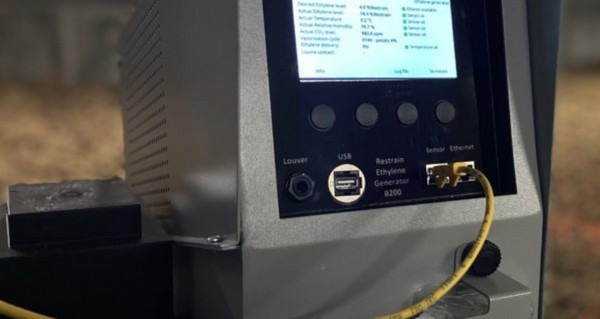The potato sector is being negatively affected by the coronavirus. Due to the fall in demand for processing potatoes (including from the catering sector), potatoes are remaining in storage for longer as they await a buyer. This year, therefore, it is extra important that optimal storage conditions are created for potatoes. In the meantime, however, the ban on the sprout suppressant CIPC will take effect in October. Grower Van Dijk has found a good alternative in ethylene gas.
The timing may seem unfortunate, i.e. just when the potato market is under pressure, but the ban on CIPC has been a long time coming. And with good reason: the residue left behind by the chemical agent has been proven harmful to human health and to the environment. Continuing to use CIPC is therefore not an option. But what is the alternative?

Sprout suppression using ethylene
Grower Van Dijk in Emmen, the Netherlands, is one of the many agricultural companies that have switched from CIPC to ethylene as a sprout inhibitor. This is a natural gas which suppresses cell growth in potatoes. By dispersing ethylene in the potato storage space to a precise protocol over the storage period, potatoes remain dormant, and sprouting and internal germination are prevented.
Switching from CIPC to ethylene
“We have about 3,000 tonnes of Fontane and Novano potatoes in storage”, a Van Dijk spokesperson told us. “For the past two years we have used the ethylene method of the Dutch company Restrain to keep them dormant. The initial motivation was primarily financial. Ethylene is a cheap alternative to CIPC. Furthermore, we didn’t have to modify our storage barn for it. In addition, with CIPC we had to be very careful not to affect our seed stock while, with ethylene, we don’t need to worry about that.”
What about fry colours?
Arguments frequently heard from growers who are not keen to stop using CIPC are that alternatives are a lot more expensive and that they affect the fry colour of the potatoes. The people at Van Dijk heard these stories too: “These concerns are unjustified. For us, the costs of ethylene-based sprout suppression are slightly higher per tonnage than with CIPC. But other alternatives are 10 to 20 euros more expensive per tonnage. In addition, we heard that growers are reluctant to use ethylene for processing potatoes. But our varieties have been tested and the results are good. We always get a good fry colour.” Download Restrain’s latest fry colour results here.
Recommended for colleagues to use
Would the company also recommend ethylene sprout suppression to colleagues? “Definitely, because it is very simple to use. Of course, with this method you are slightly more involved in the process. Before, someone came by to spray chlorpropham into the barn. But that also involved additional expense. Now all we have to do is ensure that the ethylene generator is running. That’s very easy.”
For more information:
Restrain Company Ltd
Dirk Garos
Tel: +31 (0) 6 5386 9221
Email: Dirk.Garos@restrain.eu.com
www.restrain.eu.com
